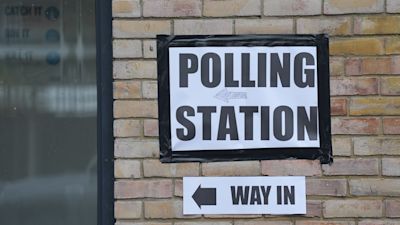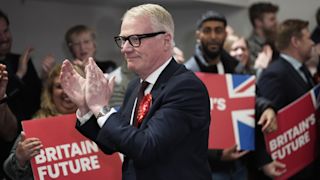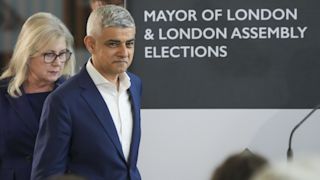May 5, 2024
R&WS Research Team
See more of our research
In January 2023, in an attempt to reset his Government’s policy agenda, Rishi Sunak named five key priorities for his Government: halve inflation, grow the economy, get the national debt falling, reduce NHS waiting lists, and stop the boats.
Announcing his priorities, Sunak promised, “No tricks… no ambiguity… we’re either delivering for you or we’re not.” He asked voters to judge his Government one year later “on the effort we put in and the results we achieve.”
Sixteen months later, in polling conducted as voters went to the polls in local elections across England, majorities of British voters say they think that Sunak will not achieve any of his priorities, that he has made no progress at all towards cutting NHS waiting lists or stopping small boats, and that he has no plan to make the UK a better place, nevermind a working plan.
When asked to rate how much Rishi Sunak has accomplished as Prime Minister, a plurality (41%) think he has accomplished ‘nothing at all,’ while just under a quarter (24%) think he has accomplished either a ‘significant’ (6%) or ‘fair’ (18%) amount.
Among Conservative voters at the last election, as many as 29% think Sunak has accomplished ‘nothing at all,’ while just 9% think he has accomplished a ‘significant’ amount.

Regarding his five priorities collectively, 38% think Sunak and his Government have made ‘no progress at all’ towards achieving these priorities. Another 38% think Sunak has made only ‘a little progress’ towards achieving them. 15% say ‘a fair amount of progress’ has been made, and just 5% think ‘a significant amount of progress’ has been achieved.
Almost half of 2019 Labour voters (47%) and more than a quarter of 2019 Conservative voters (29%) say ‘no progress at all’ has been made towards achieving these priorities.

Taken separately, majorities of Britons think Sunak and his Government have made ‘no progress at all’ towards cutting NHS waiting lists (63%), stopping small boats crossing the Channel (54%), and reducing the national debt (51%).
A plurality believe the Government has made ‘no progress at all’ towards growing the economy (44%).
Even on the one priority the Government has ostensibly achieved—halving inflation—only 9% say ‘a significant amount of progress’ has been made, against 68% who say the amount of progress that has been made is either ‘no progress at all’ (35%) or only ‘a little’ (33%).
The discrepancy between these numbers and the fact that inflation has indeed halved since last January may be down to many voters either misunderstanding what it was Sunak was committing to when he made halving inflation a priority in the first place (i.e., they thought he meant prices would fall) or being unwilling to attribute the halving of inflation to any policies set forth by the Prime Minister (who rarely, if ever, specified any active policies to halve inflation. Saying no to spending plans is a passive policy.).

With the next election drawing ever closer, majorities of voters believe the Government has not or will not ultimately achieve any of its stated priorities at the start of 2023.
Only between 19% and 32% believe Sunak and his Government will achieve any of its priorities.

At the same time, however, voters have little confidence that a Government led by Keir Starmer would have been or would now be able to achieve the same priorities.
British voters believe a Government led by Starmer would not achieve four of the five priorities named by Sunak in January 2023, while they are split 41% each on whether or not a Starmer-led Government would be able to cut NHS waiting lists.
Nevertheless, between Starmer and Sunak, pluralities say they trust Starmer the most to halve inflation (which, again Sunak has ostensibly, achieved), grow the economy, cut NHS waiting lists, and reduce the national debt.
A plurality of 40%, meanwhile, answer ‘neither of them’ when asked who between Sunak and Starmer they trust the most to stop small boats crossing the Channel.

When 2023 lapsed and most of Rishi Sunak’s pledges had not yet been achieved, the Prime Minister began to insist, “The plan is working,” in an earnest plea for voters to trust that results are on their way.
Altogether, 54% of voters—including 41% 2019 Conservative voters—say they think Rishi Sunak has no plan for how to make the United Kingdom a better place. Only 31% think he has a plan.
An even larger majority of 64% say they think Sunak does not have a plan for the UK that is working, including a majority (52%) of 2019 Conservative voters.

By contrast, 44% think Keir Starmer does have a plan to make the UK a better place.
However, a plurality of 40% of voters think Starmer does not have a plan that will work, against 32% who think that he does.

To find out more information about this research contact our research team. Redfield & Wilton Strategies is a member of the British Polling Council and abides by its rules. Follow us on Twitter

Election results: What are the key trends and statistics?
Sunday 5 May 2024
Sunday 5 May 2024

Credit: PA
Hundreds of different contests were held across England and Wales on May 2, ranging from the election of local councillors to choosing high-profile mayors.
Now that almost all the counting is over, here are some of the key trends to emerge from the results – and the statistics behind them.
ITV News explains.
Mayors
Labour dominated this year’s mayoral elections, notching up a string of wins by high-profile incumbents as well as scoring a clean sweep of victories in those parts of the country that were voting for a mayor for the first time.
In five of the 11 contests, Labour not only finished first but won more than 50% of the vote: Liverpool (where Steve Rotheram got 68.0%), Greater Manchester (63.4% for Andy Burnham), Salford (61.5% for Paul Dennett), South Yorkshire (50.9% for Oliver Coppard) and West Yorkshire (50.4% for Tracy Brabin).
This is no mean feat in elections held under the first-past-the-post system, where having multiple candidates on the ballot often means the winner does not end up with over half of the popular vote.
This exact scenario happened in the five other mayoral contests won by Labour candidates: London (where Sadiq Khan got 43.8% of the vote), the North East (41.3% for Kim McGuinness), East Midlands (40.3% for Claire Ward), Birmingham (37.8% for Richard Parker) and York & North Yorkshire (35.1% for David Skaith). Labour’s Sadiq Khan speaks as he is re-elected as the Mayor of LondonCredit: Jeff Moore/PA
Labour’s Sadiq Khan speaks as he is re-elected as the Mayor of LondonCredit: Jeff Moore/PA
Elections for the East Midlands, North East and York & North Yorkshire mayors were being held for the first time, meaning there was no incumbency factor to boost the chances of a particular party.
They also took place in areas that will be key Conservative-Labour battlegrounds at the next general election – particularly the East Midlands which contains a high number of marginal seats.
Seen in this context, the sole Tory success in this year’s mayoral contests, the re-election of Ben Houchen in Tees Valley, is very much an outlier, though he did – like most of the other incumbents – manage to win more than half of the vote (53.6%).
Only three candidates stood in the Tees Valley contest – Conservative, Labour and Liberal Democrat – which was the lowest number in any of this year’s mayoral elections.
Councils
Results are in from 106 of the 107 councils in England that held elections on May 2 and they show Labour has won 1,140 seats, an increase of more than 200.
The Liberal Democrats beat the Tories into second place, winning 521 seats, up nearly 100.
The Tories are just behind on 513 seats, down nearly 400.
The change in seats is the difference in the number of councillors compared with the state of the parties just before election day.
There are other ways to report the change, such as comparing this year’s results with how the parties fared the last time most of the seats were elected, though this overlooks factors such as by-elections and defections.
Independent candidates have won 228 seats, down 28, the Greens have won 181, up 64, while Reform has won two, down one. Rishi Sunak said the results had been ‘disappointing’ but hailed his party’s victory in Tees ValleyCredit: Owen Humphreys/PA
Rishi Sunak said the results had been ‘disappointing’ but hailed his party’s victory in Tees ValleyCredit: Owen Humphreys/PA
The new-look council map of England shows a continuation of the trend that emerged in last year’s local elections: a tilt away from the Conservatives and towards councils controlled by other parties or where no party has a majority.
The Tories lost control of 10 local authorities on May 2: Adur in West Sussex, Nuneaton & Bedworth in Warwickshire, Redditch in Worcestershire and Rushmoor in Hampshire to Labour; Dorset to the Lib Dems; and Basildon in Essex, Dudley in the West Midlands, Gloucester, Havant in Hampshire and North East Lincolnshire to no overall control.
They also shed councillors in many areas, including losing 12 at Stroud in Gloucestershire, 12 at Maidstone in Kent, 11 at Peterborough, 10 at Thurrock in Essex and nine at Cherwell in Oxfordshire; were reduced to just one councillor at Stevenage and Wigan; and were wiped out entirely at Castle Point in Essex, Cheltenham, Sheffield and South Tyneside.
Many of these are in parts of the country that will be key battlegrounds at the next general election, with Labour hoping to make gains from the Tories in the Midlands and the South East, and the Lib Dems eyeing the “blue wall” in the South West.

Richard Parker: Who is the new mayor for the West Midlands?

Labour's Sadiq Khan wins historic third term as London mayor
A more localised trend specific to these local elections led to Labour losing control of two councils, Oldham in Greater Manchester and Kirklees in West Yorkshire.
In both areas, Independent candidates made gains at Labour’s expense, while in Rochdale in Greater Manchester the Workers Party – led by George Galloway – gained two seats from Labour.
These changes could reflect unhappiness with Labour among some of its supporters in traditional heartlands in northern England, linked to the party’s policy towards the Israel-Hamas conflict.
Meanwhile another result that could have consequences for the general election occurred in Bristol, where the Greens made 10 gains to become the largest party on the council.
The parliamentary seat of Bristol Central is the Greens’ number one election target – and they have just won every council seat inside the constituency.
But the overall picture chimes with the trend evident in the mayoral and council elections: that of the Conservatives losing ground in many areas of the country.
Hundreds of different contests were held across England and Wales on May 2, ranging from the election of local councillors to choosing high-profile mayors.
Now that almost all the counting is over, here are some of the key trends to emerge from the results – and the statistics behind them.
ITV News explains.
Mayors
Labour dominated this year’s mayoral elections, notching up a string of wins by high-profile incumbents as well as scoring a clean sweep of victories in those parts of the country that were voting for a mayor for the first time.
In five of the 11 contests, Labour not only finished first but won more than 50% of the vote: Liverpool (where Steve Rotheram got 68.0%), Greater Manchester (63.4% for Andy Burnham), Salford (61.5% for Paul Dennett), South Yorkshire (50.9% for Oliver Coppard) and West Yorkshire (50.4% for Tracy Brabin).
This is no mean feat in elections held under the first-past-the-post system, where having multiple candidates on the ballot often means the winner does not end up with over half of the popular vote.
This exact scenario happened in the five other mayoral contests won by Labour candidates: London (where Sadiq Khan got 43.8% of the vote), the North East (41.3% for Kim McGuinness), East Midlands (40.3% for Claire Ward), Birmingham (37.8% for Richard Parker) and York & North Yorkshire (35.1% for David Skaith).
 Labour’s Sadiq Khan speaks as he is re-elected as the Mayor of LondonCredit: Jeff Moore/PA
Labour’s Sadiq Khan speaks as he is re-elected as the Mayor of LondonCredit: Jeff Moore/PAElections for the East Midlands, North East and York & North Yorkshire mayors were being held for the first time, meaning there was no incumbency factor to boost the chances of a particular party.
They also took place in areas that will be key Conservative-Labour battlegrounds at the next general election – particularly the East Midlands which contains a high number of marginal seats.
Seen in this context, the sole Tory success in this year’s mayoral contests, the re-election of Ben Houchen in Tees Valley, is very much an outlier, though he did – like most of the other incumbents – manage to win more than half of the vote (53.6%).
Only three candidates stood in the Tees Valley contest – Conservative, Labour and Liberal Democrat – which was the lowest number in any of this year’s mayoral elections.
Councils
Results are in from 106 of the 107 councils in England that held elections on May 2 and they show Labour has won 1,140 seats, an increase of more than 200.
The Liberal Democrats beat the Tories into second place, winning 521 seats, up nearly 100.
The Tories are just behind on 513 seats, down nearly 400.
The change in seats is the difference in the number of councillors compared with the state of the parties just before election day.
There are other ways to report the change, such as comparing this year’s results with how the parties fared the last time most of the seats were elected, though this overlooks factors such as by-elections and defections.
Independent candidates have won 228 seats, down 28, the Greens have won 181, up 64, while Reform has won two, down one.
 Rishi Sunak said the results had been ‘disappointing’ but hailed his party’s victory in Tees ValleyCredit: Owen Humphreys/PA
Rishi Sunak said the results had been ‘disappointing’ but hailed his party’s victory in Tees ValleyCredit: Owen Humphreys/PAThe new-look council map of England shows a continuation of the trend that emerged in last year’s local elections: a tilt away from the Conservatives and towards councils controlled by other parties or where no party has a majority.
The Tories lost control of 10 local authorities on May 2: Adur in West Sussex, Nuneaton & Bedworth in Warwickshire, Redditch in Worcestershire and Rushmoor in Hampshire to Labour; Dorset to the Lib Dems; and Basildon in Essex, Dudley in the West Midlands, Gloucester, Havant in Hampshire and North East Lincolnshire to no overall control.
They also shed councillors in many areas, including losing 12 at Stroud in Gloucestershire, 12 at Maidstone in Kent, 11 at Peterborough, 10 at Thurrock in Essex and nine at Cherwell in Oxfordshire; were reduced to just one councillor at Stevenage and Wigan; and were wiped out entirely at Castle Point in Essex, Cheltenham, Sheffield and South Tyneside.
Many of these are in parts of the country that will be key battlegrounds at the next general election, with Labour hoping to make gains from the Tories in the Midlands and the South East, and the Lib Dems eyeing the “blue wall” in the South West.

Richard Parker: Who is the new mayor for the West Midlands?

Labour's Sadiq Khan wins historic third term as London mayor
A more localised trend specific to these local elections led to Labour losing control of two councils, Oldham in Greater Manchester and Kirklees in West Yorkshire.
In both areas, Independent candidates made gains at Labour’s expense, while in Rochdale in Greater Manchester the Workers Party – led by George Galloway – gained two seats from Labour.
These changes could reflect unhappiness with Labour among some of its supporters in traditional heartlands in northern England, linked to the party’s policy towards the Israel-Hamas conflict.
Meanwhile another result that could have consequences for the general election occurred in Bristol, where the Greens made 10 gains to become the largest party on the council.
The parliamentary seat of Bristol Central is the Greens’ number one election target – and they have just won every council seat inside the constituency.
But the overall picture chimes with the trend evident in the mayoral and council elections: that of the Conservatives losing ground in many areas of the country.
No comments:
Post a Comment